Could a playlist help your business succeed?
HOME / / Could a playlist help your business succeed?

Studies have shown that the right playlist can drastically improve your productivity in a number of ways.
Key findings from these studies are:
An unproductive workforce costs British businesses £143 billion each year
Happy music can make you 23% more creative
High noise levels decrease your cognitive ability
Music with a heavier bass is more effective at increasing your confidence
Relaxing music with a slower bpm can reduce anxiety by 65%
Dance music increases proof-reading speed by 20%
Music has the power to entice a range of emotions, moods and productivity. By looking at some of the tasks and types of work different sectors are faced with on a daily basis, Transmit Startups have discovered the best music hacks for your career. Some could even make you work 20% faster!
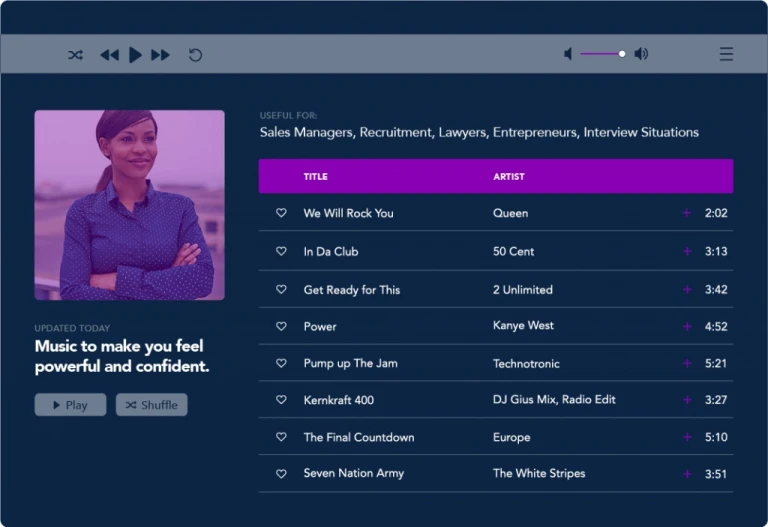
Listening to 50 Cent can almost double your confidence before a pitch
Maybe you’re about to attend an important client meeting, or closing on a deal, but you just need that extra bit of confidence. Luckily for you, there is such a thing as confidence-boosting music and it’s all in the bass.
Researchers from The Society for Personality and Social Psychology split participants into two groups. One group listened to a ‘high-power’ music playlist (consisting of We Will Rock You – Queen, Get Ready for This – 2 Unlimited, and In Da Club – 50 Cent) the other group listened to similar songs but identified as ‘low-power’ inducing from a previous survey.
When the ‘high-power’ group was shown a word fragment like P _ _ ER, they were more likely to complete the fragment as POWER, yet those listening to the low-power music, often completed it as PAPER.
As both groups were asked to fill the gaps with the first word that came to mind, it suggests that the power of music could be unconscious.
What’s more, in another experiment partakers were asked if they would prefer to go first or second in a debate. Those who listened to the high-power music chose to go first almost twice as much (34%) than those who listened to the low-power playlist (20%).
For the final experiment, scientists manipulated songs to amp up the bass. Amazingly, songs with much heavier bass were more effective in empowering the group.
The scientists concluded that this type of music should be utilised, especially in the workplace. Previous studies have found feelings of power help us to perform better in interview situations, so go ahead and don’t be ashamed to blast some bass, it’s good for you!
Lee Chambers MBPsS is an Environmental Psychologist and Wellbeing Trainer at Essentialise Workplace Wellbeing. He says 'A significant psychological benefit of music is its ability to boost performance. A strong, rhythmic beat, combined with a fast tempo, has the capacity to stimulate your physiological and emotional arousal state, which is perfect when you have that big interview or presentation. Listen to this music beforehand, and when you walk in you will already be in a positive high arousal state, making it much easier to perform at an optimal level and boost your success.'
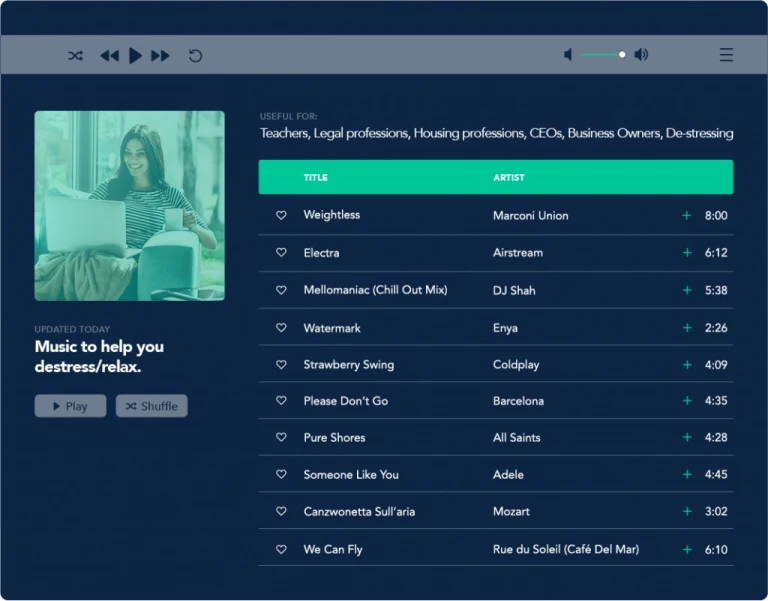
Reduce Anxiety by 65% with this one song
Certain careers such as those in welfare, teachers, legal, or running your own business can have a huge amount of workplace stress. If you regularly find yourself stressed out and anxious at work, music could help ease the tension.
The song ‘Weightless’ by Marconi Union can, amazingly, can reduce anxiety by 65%. It was found to be 11% more relaxing than any other song in a study by Dr. David Lewis-Hodgson of Mindlab International.
The band reportedly worked with therapists and scientific theory to create this ultra-relaxing piece of music. The song starts at 60bpm and eventually slows to 50bpm, remarkably your heart rate falls to match the beat while listening. In fact, it’s so effective that some participants became drowsy.
Coldplay’s ‘Strawberry Swing’ contains carefree, upbeat lyrics. It also has a slightly higher tempo, and so together, these elements promote more a feeling of contentment than drowsy relaxation.
And in a study by Penn Medicine in 2019, music was found to be ‘a viable alternative to sedative medications in reducing patient anxiety prior to an anesthesia procedure.’ Researchers evaluated anxiety levels of patients before and after the use of music in one group and medication in another and similar changes in the levels of anxiety were found in each.
Fabio D’Andrea is an acclaimed neo-classical pianist and short film director. He says that 'Music is very powerful but most people don't appreciate or understand in what way it can really benefit them, especially when it comes to work. We perform at our best and are more focused when we are calm, relaxed and don't feel pressurised.' He goes on to explain that 'classical music, particularly relaxing music and sounds of certain instruments such as the piano, help bring our stress levels down and alleviate anxiety, and it can do so very quickly. When we are relaxed we are also more confident and can deliver on targets, presentations and anything very focused with much more clarity'.
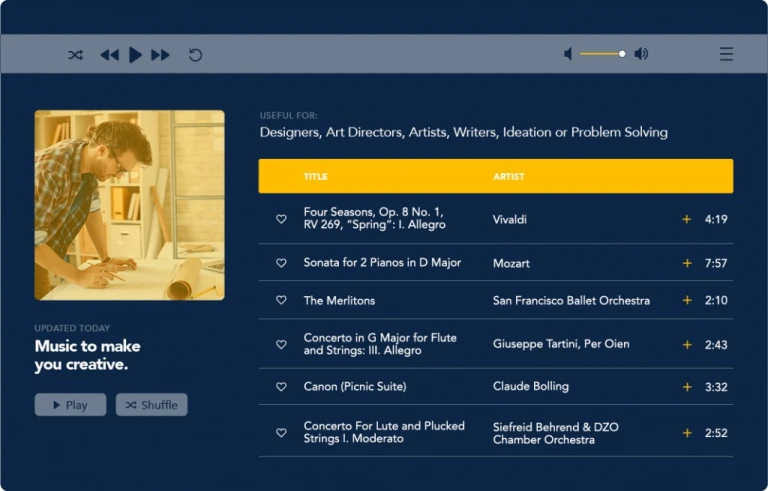
Revealed: The music that makes you 23% more creative
Research shows that happy music could be your best bet to improve your creativity. Scientists from the Netherlands and Australia decided to put it to the test.
Half of the participants sat in silence and the other half listened to upbeat classical music. Both participants were asked to come up with as many different and creative uses for a brick.
The study found that those who listened to the ‘Vivaldi’s Four Seasons, Op. 8 No. 1, RV 269, “Spring”: I. Allegro’ – a happy classical song, scored 23% higher (a mean score of 93.87) than those who completed the test in silence (a mean of 76.10).
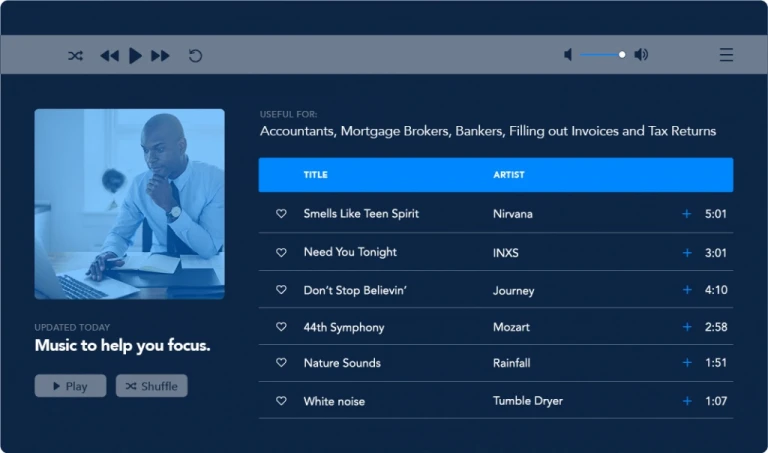
Classical and rock music can make you 12% faster with numbers
If you want to do some data processing, or perhaps you look at numbers daily and need a bit of a boost, rock music could be the aid you need.
According to a study in the journal of Neuroscience and Behavioural Physiology, participants were tasked with identifying Arabic numbers amongst a selection of random images to make the numbers hard to recognise.
Despite the difficulty of the task, those who completed it whilst classical or rock music was playing were able to recognise the numbers 0.2 seconds quicker and were 87% (12% more than the no music group) likely to correctly identify the Arabic numbers.
Lee Chambers believes that music can help give us the edge over our peers if we use it to help us focus and increase our productivity. We can do this by using background music that improves our cognitive performance. He explains that 'upbeat instrumental tracks played quietly flow into our conscious and speed us up, helping us into flow states that allow productive periods of deep, focused work'.
Another tip from Lee is that 'as humans, we have ultradian rhythms that usually run in 60 to 90 minute cycles. Pair the music to your cycles and then take a break and disconnect from work.This allows you to reconnect for another period of deep work and will enable you to work in waves, which is a highly productive way to work and boost your wellbeing at the same time'.
Researchers at Rensselaer Polytechnic Institute in New York also found that nature sounds, such as a babbling brook or rainfall, can mask more intrusive sounds and help you stay focused.
If you need even more to stop distractions, then white noise might be the thing for you. It’s often used as a sleep aid, but the sound of a fan whirring, a dryer tumbling clothes, a hair dryer or a vacuum cleaner can blend pre-existing background noise, effectively allowing you to ignore other sounds.
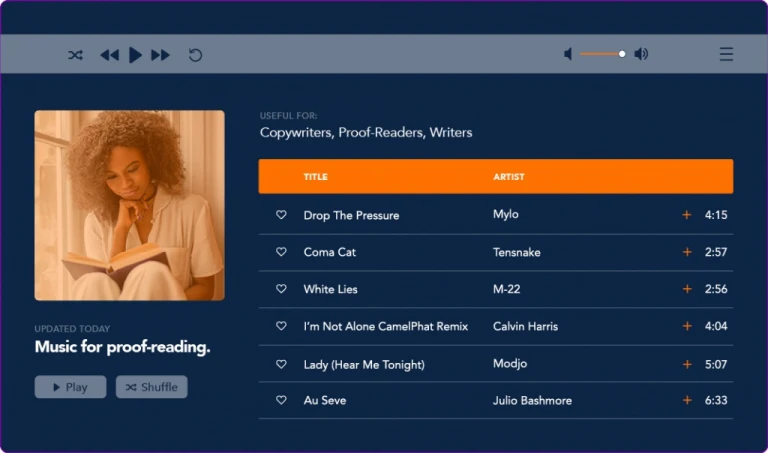
Speed Up Proof-Reading by 20% with This Dance Playlist
Ever fancied pumping up the dance and electronic tracks at work? Well there could be a good reason for it. Researchers decided to put music to the test in an office, to see how it affected workers. Surprisingly, the experiment uncovered that dance music increases proof-reading speed by 20%, compared to those who proof-read with no music at all. This genre had a huge impact on spell-checking too with a 75% pass rate – 7% higher than the group that didn’t listen to any music.
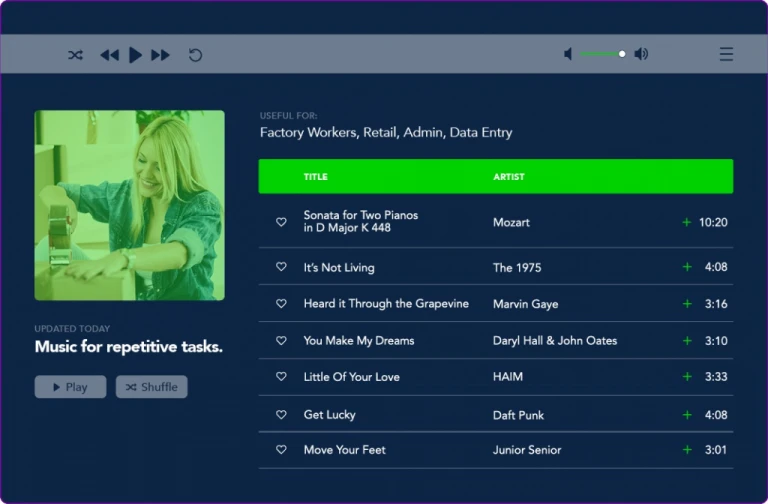
The Music with The Power to Make You More Productive in Repetitive Tasks
Perhaps you’re stacking shelves, inputting data or replying to emails. Routine tasks can be quite boring, so to liven things up and get the task finished quicker you might be better off listening to upbeat music. Scientifically speaking, music can generate the same reactions as food and other physical pleasures by stimulating the same part of the brain.
A study by the Society for Education, Music and Psychology Research found that the quality of work and the length of time it took to complete tasks for a group of Canadian software developers was lower and took longer without music.
When in need of a boost, you could try a musical 'dancebreak'. Marilyn Devonish, a neurosuccess coach has been prescribing this to her coaching and therapy clients for the past 20 years. 'Beyond feeling good, programs like those at the English National Ballet have seen a temporary cessation of Parkinson’s disease symptoms whilst people listen to music and dance, with music acting as an outside cue to move.' Although Marilyn has been using music therapeutically since 1975, she admits 'we are still just scratching the neurological surface'.
Supporting that transformative power of music, Anna Gillet, owner of Golden Activities, which provides meaningful person centred activities for the elderly, believes 'music is magic'. She uses music in her activities with dementia patients and says she watches music transform clients every day. 'There’s a lady who I have the pleasure of working with who, never says much at all. During our first session I played ‘Jerusalem’ sung by Katherine Jenkins. Her body language totally changed. She visibly relaxed, her smile appeared & best of all she sang every word. It was wonderful. It transformed into the woman she once was.'
The Wrong Office Playlist Could Be Costing Your Businesses £40,500 a Year
Not all music was created equal, in fact the wrong type of music could be having a detrimental effect on your productivity, even costing your business thousands. If you are a sole trader, your own lack of productivity could cost your business £4,500 a year, but more than 95% of UK businesses are micro-businesses, meaning that they have 1-9 employees. For a business with 9 employees, that cost jumps to £40,500 a year.
Studies have shown that multitasking slows us down and makes our brains less efficient. So, what does this have to do with music? Well, if the office music is taking too much of our attention, or adversely, not masking other distractions, it could essentially mean we’re multitasking to the extreme and falling into a productivity crisis.
Diana Dimofte, founder of Alpha Sounds uses music in much of her work as a consultant, saying, 'music is a living, active force and energy. It has the power to heal or poison. When listening to a tune ask yourself: is this music positive, uplifting, inspiring? Is it nursing, transformative, feeding the soul or feeding wounds?'
The Future of Music
Carsten Olesen, President of Consumer Audio at HARMAN International believes we are in an emerging sonic revolution. He says 'We at HARMAN are calling this the "Decade of Sound.”'
HARMAN and market research company Futuresource Consulting conducted a survey with more than 8,000 consumers across six countries concerning 'The Future of Listening'. The results showed the following:
92% of Brits believe music eases everyday pressures
90% consider sound an integral part of life
81% of UK respondents say music makes them feel happy
57% report their music consumption has increased compared to a year ago
Carsten explains, 'audio offers a vital escape from today’s visual overstimulation, thereby creating the potential to improve focus, wellbeing and productivity'.
Music can help you cope
Marianne Rizkallah, a Music Therapist with North London Music Therapy says, 'Music can help us through challenging times by attempting to change our mood - when we play a piece of music that sounds very different to how we're feeling - or can affirm or complement our inner feelings, e.g. playing slow music in a minor key when feeling sad, it can put us in touch with what we're feeling at a deeper level, help us connect emotionally to our thoughts and bring us to a place of greater understanding about ourselves as we experience heightened emotional insight.'*
Lee Chambers agrees. 'In these challenging times, where we have limited access to some of the things that can give us the edge, music becomes even more vital.'
He goes on to say that 'while some people only see it as entertainment, the mental benefits of incorporating music into your everyday life are so valuable that everybody should be using it. And in some ways, it's a hidden advantage that you can leverage, to get closer to your potential'.
Lee concludes that 'access to music has never been greater. It’s the perfect time to use it to feel happier, more motivated and be more relaxed in your life'.
In defiance of Covid-19, Fabio D’Andrea created an uplifting classical music album with Game of Throne’s Natalie Dormer dancing for the first time in public. It’s called No Day Shall Erase You. He has also recently been taking requests on Instagram, so if you fancy seeing an award winning composer and pianist playing everything from Baby Shark to complicated classical, go take a peek.
*North London Music Therapy is offering support during COVID19 to all front-line workers for free. Please see northlondonmusictherapy.com/covid19-support for more information.

"We’re delighted to be the 2000th loan recipients!"
